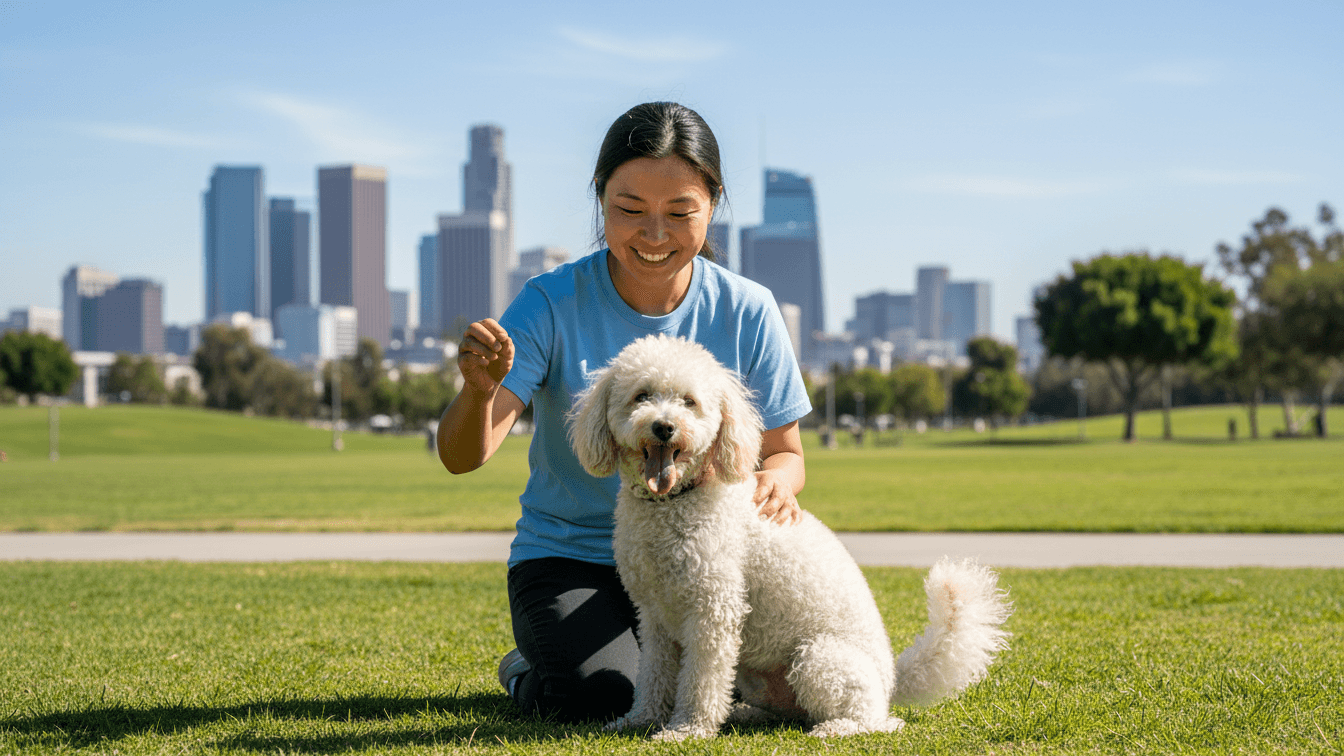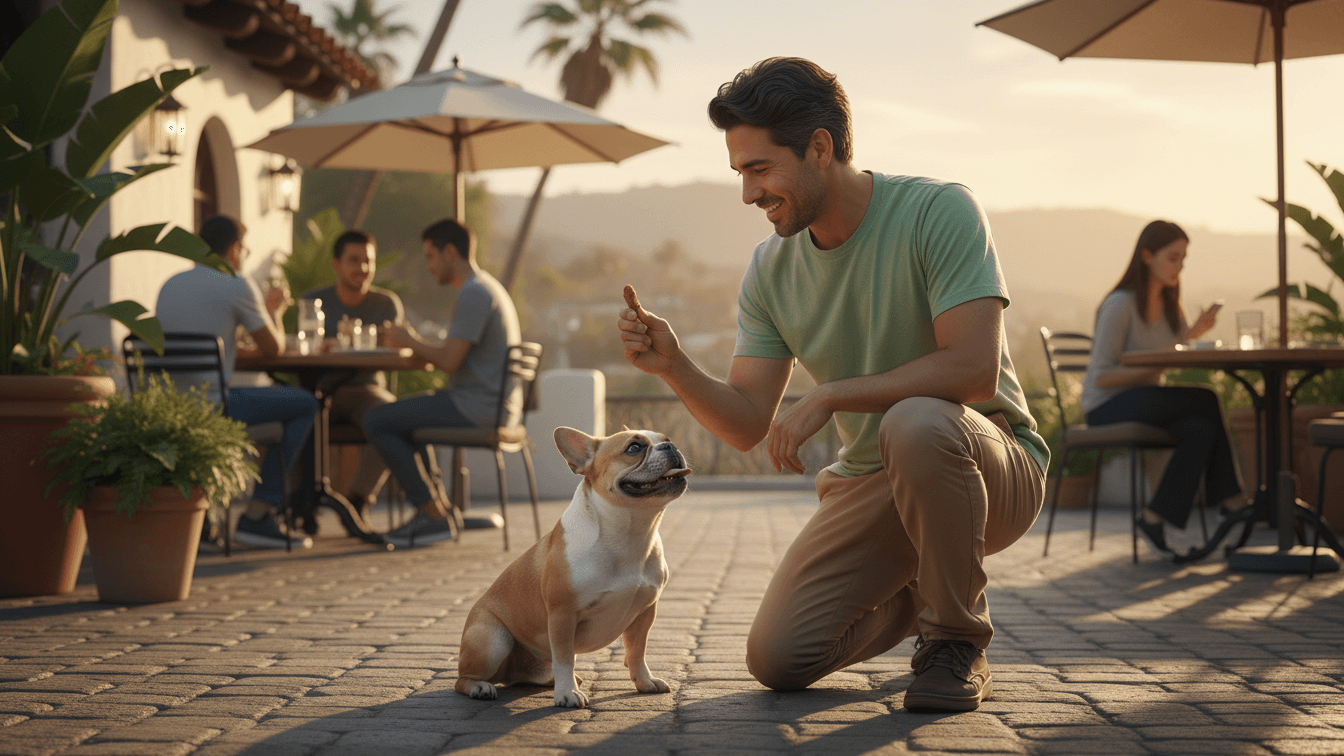Your Complete Guide to Choosing a Dog Trainer in Los Angeles
Living with a dog in Los Angeles means navigating crowded sidewalks, dog-friendly patios in Silver Lake, weekend hikes in Griffith Park, and busy beach days in Venice. Your dog needs to handle all of this without pulling on leash, jumping on strangers, or melting down around other dogs.
Since Los Angeles sits in Los Angeles County, most local rules follow city and county guidelines. When you find a trainer who understands these urban challenges, you’ll get better results both at home and out in the community.
How to Choose the Right Trainer
Start by looking for someone who uses positive reinforcement training and can set realistic goals for your Los Angeles lifestyle. This means your dog should learn to walk calmly past street performers, stay focused near outdoor dining areas, and handle crowded parks without losing control.
Credentials give you a quick way to compare trainers’ experience levels. Common dog trainer certifications include KPA-CTP, CPDT-KA, or IAABC-CDBC for behavior problems. If your dog has serious aggression issues, look for someone with CBCC-KA or a science-based program like CTC.
In-home dog training works great for apartment manners, door greetings, and leash skills around your specific neighborhood. Group classes make sense once your dog can focus around other dogs, especially before you try busy spots like Runyon Canyon or the Sunset Junction Farmers Market.
Common Dog Training Methods Explained

Reward-based methods build the trust you want while creating lasting behavior changes. They also help you follow Los Angeles’ strict rules about keeping dogs under control in public.
Basic obedience covers sit, down, stay, place, recall, and leash training so your dog can handle walks, restaurant patios, and park visits without pulling or jumping on people. These skills matter even more when you’re sharing tight spaces with crowds of pedestrians.
Puppy training focuses on socialization, potty training, bite control, crate comfort, and early leash skills. Starting with short, positive sessions prevents bad habits from forming in the first place, which is critical when you’re raising a puppy in a small apartment or condo.
Behavior modification addresses fear, reactivity, resource guarding, or separation anxiety through careful desensitization and counterconditioning. For serious cases, ask if your trainer works with local veterinarians or veterinary behaviorists.
Private lessons and in-home sessions let you customize everything around your daily routines, while day training can speed up results when you’re juggling long commutes or demanding work schedules.
Dog training classes help your dog practice good manners around other dogs and people. The best classes give dogs plenty of space, screen participants carefully, and teach calm behavior rather than just excitement.
Specialized training like therapy dog training or service dog training requires extra structure, public-access skills, and a very clear step-by-step program. Los Angeles offers plenty of opportunities for therapy dogs in hospitals, schools, and senior facilities throughout the city.
Stay away from trainers who use fear, intimidation, or pain to get results. Humane methods are safer for everyone, easier to maintain long-term, and much better for keeping peace with your neighbors in close-quarters apartment living.
Average Cost of Dog Training in Los Angeles (Updated for 2025)
Prices around Los Angeles and Los Angeles County depend on the trainer’s experience, how long training sessions last, and where the training happens. Here’s what most local pet owners are paying in 2025.
| Service Type | Average Cost (Los Angeles/LA County) |
|---|---|
| Puppy classes (4-6 weeks) | $200-$350 total |
| Group obedience classes (4-6 weeks) | $225-$375 total |
| Private lessons (60-90 min) | $150-$250 per session |
| In-home coaching packages (4-6 visits) | $600-$1,200 total |
| Day training (trainer works your dog + handoff) | $700-$1,400 per week |
| Behavior consult for reactivity/anxiety (initial) | $200-$350 |
| Board and train (2-4 weeks) | $3,000-$6,500 total |
You’ll probably pay extra travel fees for longer distances within LA County, and expect higher rates for complex behavior work or trainers with advanced certifications.
Make sure you understand what’s included, how the trainer tracks progress, and whether they offer a free consultation or free evaluation before you sign up.
Questions to Ask a Potential Dog Trainer
- What training methods do you use, and how do you keep sessions positive and low-stress?
- What credentials do you have, like CPDT-KSA or KPA-CTP? Do you keep up with continuing education?
- How will you customize the training program for my dog’s specific needs and our Los Angeles lifestyle?
- Do you offer in-home visits, group classes, or day training, and which approach fits my goals best?
- How will we measure my dog’s progress and know when to add more distractions?
- What are the total costs, including any travel fees, and what’s your cancellation policy?
- Do you carry liability insurance, and can you show me proof?
- For behavior problems, will you work with my veterinarian if needed?
- What should I practice between our sessions to help my dog keep improving?
Local Los Angeles Rules and Considerations
Los Angeles enforces strict leash laws and nuisance rules to keep parks and neighborhoods safe for everyone. Los Angeles County follows California’s public health requirements too.
Leashes are required in all public spaces except inside designated off-leash dog parks. Keep a standard 6-foot leash with you for sidewalks, beaches, and community events.
California law requires current rabies vaccination for all dogs over four months old. You can get these through county clinics or your regular vet, and find more details on the Los Angeles County Department of Public Health website.
Excessive barking can be considered a nuisance under Los Angeles Municipal Code Section 53.63, so work with your trainer on alert barking and separation anxiety before neighbors start complaining. Building managers in multi-unit housing can also enforce stricter policies.
Los Angeles has specific dog waste ordinances requiring immediate cleanup in public spaces. Many apartment buildings in areas like Downtown LA and Koreatown have their own additional pet policies regarding noise and behavior.
California doesn’t require special licenses for professional dog trainers, but dog training services that board dogs for payment may need permits through Los Angeles Animal Services. Trainers who want to use city parks for commercial sessions typically need permits and proof of insurance.
Los Angeles Animal Services oversees licensing, spay/neuter programs, and animal welfare throughout the city. You can find resources about lost pets, microchips, and licensing requirements on their website.
Local Los Angeles Resources for Dog Owners
These spots give you great places to practice polite manners, work on recalls, and provide safe enrichment for your dog. Always follow the posted rules and etiquette guidelines.
- Griffith Park Dog Park offers a large fenced area near the Vermont Canyon entrance, perfect for recall practice and socialization. Visit during off-peak hours if your dog is still building confidence.
- Silver Lake Dog Park provides a smaller fenced space that’s excellent for dogs who get overwhelmed in larger settings. The separate small-dog area helps with controlled introductions.
- Runyon Canyon Park allows off-leash dogs in designated areas, giving you real-world training opportunities around hikers, wildlife, and stunning city views. Start with the less crowded Fuller Avenue entrance.
- Rosie's Dog Beach in Long Beach is the only off-leash dog beach in LA County, offering fantastic opportunities to work on recalls and calm behavior around water and other dogs.
- Sepulveda Basin Off-Leash Dog Park in Encino features wide-open spaces that are perfect for distance recalls and advanced obedience training.

FAQs
How much does in-home dog training cost?
Most Los Angeles trainers charge $150-$250 per in-home visit, with discounts available when you buy packages. Behavior problems typically start at the higher end of that range, and trainers may charge more for travel to farther neighborhoods.
Is in-home dog training worth it?
Absolutely, because you’re working on problems exactly where they happen. Your trainer can fix door manners, jumping on guests, counter-surfing, and window reactivity right at home, then step outside to practice leash skills on your actual neighborhood sidewalks with real distractions.
Can you pay someone to house train your dog?
Yes, many trainers offer puppy programs that include potty training, crate routines, and daily schedules. Day training can speed up the process while teaching you how to maintain the progress, which is especially helpful for apartment dwellers.
What is the 3-3-3 rule for dog training?
This is a helpful timeline for new or adopted dogs: expect about 3 days for your dog to decompress, 3 weeks to learn your routines, and 3 months to feel completely settled. Good training programs work with this natural adjustment period instead of rushing results.
How long will it take to reach my training goals?
Most puppies and friendly adult dogs show solid progress within 4-8 weeks if you practice daily. Fear, reactivity, or aggression typically requires several months of careful behavior modification with gradual increases in difficulty.
What should I bring to group classes?
Pack a flat collar or harness, a 6-foot leash, high-value treats, water, and current vaccination records if your trainer requests them. Leave retractable leashes at home for safety reasons, especially in crowded Los Angeles training facilities.
What’s the leash law in Los Angeles?
Dogs must be leashed and under control in all public areas, except inside designated off-leash dog parks or specific off-leash zones like parts of Runyon Canyon. Keep that 6-foot leash handy for sidewalks, beaches outside of Rosie’s Dog Beach, and community events.
Do I need a dog license in Los Angeles or Los Angeles County?
Yes, Los Angeles requires all dogs over four months old to be licensed. You can register through Los Angeles Animal Services online or at any animal shelter. Licenses are cheaper if your dog is spayed or neutered.
What shots does my dog need in Los Angeles County or California?
Rabies vaccination is required throughout California for dogs over four months old. Your veterinarian may also recommend distemper-parvo, bordetella, and leptospirosis based on your dog’s lifestyle and exposure to other dogs at parks or beaches.
Are dog trainers required to be licensed in Los Angeles or Los Angeles County or California?
No special trainer licenses exist in California. Expert dog trainers follow normal business regulations, but if they offer board and train services, their facility may need to meet specific requirements through Los Angeles Animal Services or county regulations.
Where can I practice off-leash recall?
Use fenced dog parks throughout Los Angeles like Griffith Park Dog Park, Silver Lake Dog Park, or Sepulveda Basin Off-Leash Dog Park to keep things safe and legal. Designated off-leash areas at Runyon Canyon also work well once your dog has solid basic skills.
Which dog parks allow training around Los Angeles?
Most Los Angeles dog parks welcome training as long as you’re not disrupting other dogs or blocking entry gates. Griffith Park Dog Park, Silver Lake Dog Park, and Laurel Canyon Dog Park are all popular spots for working on socialization and obedience training.
What beaches or trails allow dogs for training?
Rosie’s Dog Beach in Long Beach is the only legal off-leash dog beach in LA County and offers excellent real-world training opportunities. Most other beaches require leashes but allow dogs before 10 AM or after certain hours. Leashed dogs are welcome on many trails in Griffith Park and Topanga State Park, perfect for teaching calm focus around hikers and wildlife.
How do I help my dog handle Los Angeles traffic and noise?
Start desensitization work at home using recorded city sounds at low volume, then gradually increase intensity. Practice calm behavior near quiet streets before moving to busier intersections. Many trainers offer specialized city-dog programs that address car reactivity, skateboards, and sudden loud noises.
What should I do if my dog is reactive on Los Angeles sidewalks?
Work with a certified dog trainer who specializes in behavior modification and reactivity. Practice at quieter times of day, use high-value treats, and keep enough distance from triggers so your dog can focus. Consider early morning walks in less crowded neighborhoods like Studio City or Culver City before building up to busier areas.
Can I take my dog on LA Metro trains and buses?
Small dogs in carriers are allowed on Metro trains and buses. Larger dogs must be service dogs to ride without a carrier. If you’re working toward service dog training, make sure you understand the specific public-access requirements before attempting transit training.
The right combination of thoughtful planning, humane methods, and consistent practice around Los Angeles’ parks and neighborhoods will help your dog become a confident, well-behaved dog. Whether you’re in Echo Park, West Hollywood, Santa Monica, or Downtown LA, finding the right professional dog trainer who understands urban living makes all the difference for long-term success.
